

Most ebook files are in PDF format, so you can easily read them using various software such as Foxit Reader or directly on the Google Chrome browser.
Some ebook files are released by publishers in other formats such as .awz, .mobi, .epub, .fb2, etc. You may need to install specific software to read these formats on mobile/PC, such as Calibre.
Please read the tutorial at this link: https://ebookbell.com/faq
We offer FREE conversion to the popular formats you request; however, this may take some time. Therefore, right after payment, please email us, and we will try to provide the service as quickly as possible.
For some exceptional file formats or broken links (if any), please refrain from opening any disputes. Instead, email us first, and we will try to assist within a maximum of 6 hours.
EbookBell Team

4.1
100 reviewsThis book covers new aspects and frameworks of control, design, and optimization based on the TP model transformation and its various extensions. The author outlines the three main steps of polytopic and LMI based control design: 1) development of the qLPV state-space model, 2) generation of the polytopic model; and 3) application of LMI to derive controller and observer. He goes on to describe why literature has extensively studied LMI design, but has not focused much on the second step, in part because the generation and manipulation of the polytopic form was not tractable in many cases. The author then shows how the TP model transformation facilitates this second step and hence reveals new directions, leading to powerful design procedures and the formulation of new questions. The chapters of this book, and the complex dynamical control tasks which they cover, are organized so as to present and analyze the beneficial aspect of the family of approaches (control, design, and optimization). Additionally, the book aims to convey simple TP modeling; a new convex hull manipulation based possibilities for optimization; a general framework for stability analysis; standardized modeling and system description; relaxed and universal LMI based design framework; and a gateway to time-delayed systems.